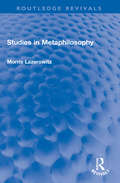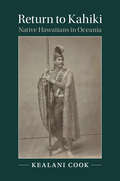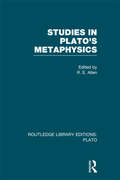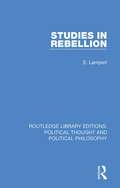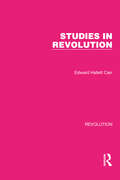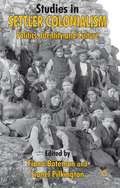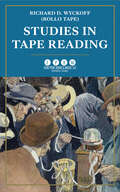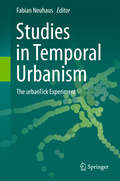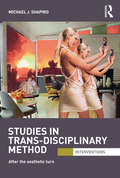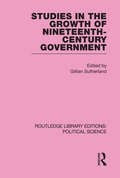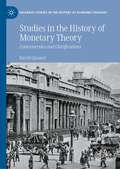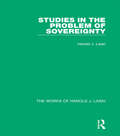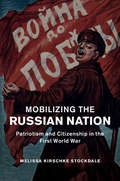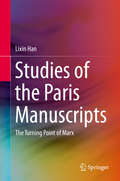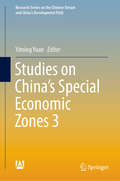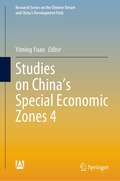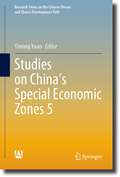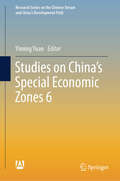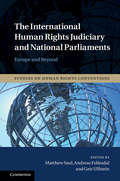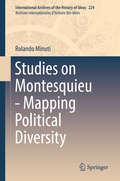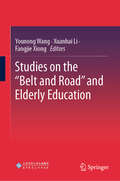- Table View
- List View
Studies in Metaphilosophy (Routledge Revivals)
by Morris LazerowitzFirst Published in 1964, Studies in Metaphilosophy presents and develop the hypothesis about the nature of metaphysical theories. Each study is a fresh attempt to improve our understanding of what a philosophical theory is and what its supporting arguments come to. Author argues that philosophical theories are nothing more substantial than linguistic chimeras and has the important function of pointing up the need for the examination of the whole subject. The volume discusses important themes like concept analysis, systematic doubt, the method of deduction from fact, logical necessitation, the nature of philosophical analysis, the nature of value, the metaphysical concept of space, Moore and philosophical analysis, the hidden structure of philosophical theories, and the relevance of psychoanalysis to philosophy. This volume will be an essential source for scholars and researchers of philosophy, logic, and metaphysics.
Studies in North American Indian History: Native Hawaiians in Oceania (Studies in North American Indian History)
by Kealani CookBetween 1850 and 1907, Native Hawaiians sought to develop relationships with other Pacific Islanders, reflecting how they viewed not only themselves as a people but their wider connections to Oceania and the globe. Kealani Cook analyzes the relatively little known experiences of Native Hawaiian missionaries, diplomats, and travelers, shedding valuable light on the rich but understudied accounts of Hawaiians outside of Hawaiʻi. Native Hawaiian views of other islanders typically corresponded with their particular views and experiences of the Native Hawaiian past. The more positive their outlook, the more likely they were to seek cross-cultural connections. This is an important intervention in the growing field of Pacific and Oceanic history and the study of native peoples of the Americas, where books on indigenous Hawaiians are few and far between. Cook returns the study of Hawai'i to a central place in the history of cultural change in the Pacific.
Studies in Plato's Metaphysics (Routledge Library Editions: Plato)
by R. E. AllenDid Plato abandon, or sharply modify, the Theory of Forms in later life? In the Phaedo, Symposium, and Republic it is generally agreed that Plato held that universals exist. But in Parmenides, he subjected that theory to criticism. If the criticism were valid, and Plato knew so, then the Parmenides marks a turning point in his thought. If, however, Plato became aware that there are radical differences in the logical behaviour of concepts, and the later dialogues are a record of his attempt to analyse those differences, then Plato’s thought can be said to have moved in a new and vitally important direction after the Parmenides. Studies in Plato’s Metaphysics brings together twenty essays by leading philosophers from the UK and the USA reflecting upon this important issue and upon the questions arising from it.
Studies in Platonic Political Philosophy
by Leo StraussOne of the outstanding thinkers of our time offers in this book his final words to posterity. Studies in Platonic Political Philosophy was well underway at the time of Leo Strauss's death in 1973. Having chosen the title for the book, he selected the most important writings of his later years and arranged them to clarify the issues in political philosophy that occupied his attention throughout his life. As his choice of title indicates, the heart of Strauss's work is Platonism—a Platonism that is altogether unorthodox and highly controversial. These essays consider, among others, Heidegger, Husserl, Nietzsche, Marx, Moses Maimonides, Machiavelli, and of course Plato himself to test the Platonic understanding of the conflict between philosophy and political society. Strauss argues that an awesome spritual impoverishment has engulfed modernity because of our dimming awareness of that conflict. Thomas Pangle's Introduction places the work within the context of the entire Straussian corpus and focuses especially on Strauss's late Socratic writings as a key to his mature thought. For those already familiar with Strauss, Pangle's essay will provoke thought and debate; for beginning readers of Strauss, it provides a fine introduction. A complete bibliography of Strauss's writings if included.
Studies in Platonic Political Philosophy
by Leo StraussOne of the outstanding thinkers of our time offers in this book his final words to posterity. Studies in Platonic Political Philosophy was well underway at the time of Leo Strauss's death in 1973. Having chosen the title for the book, he selected the most important writings of his later years and arranged them to clarify the issues in political philosophy that occupied his attention throughout his life. As his choice of title indicates, the heart of Strauss's work is Platonism—a Platonism that is altogether unorthodox and highly controversial. These essays consider, among others, Heidegger, Husserl, Nietzsche, Marx, Moses Maimonides, Machiavelli, and of course Plato himself to test the Platonic understanding of the conflict between philosophy and political society. Strauss argues that an awesome spritual impoverishment has engulfed modernity because of our dimming awareness of that conflict. Thomas Pangle's Introduction places the work within the context of the entire Straussian corpus and focuses especially on Strauss's late Socratic writings as a key to his mature thought. For those already familiar with Strauss, Pangle's essay will provoke thought and debate; for beginning readers of Strauss, it provides a fine introduction. A complete bibliography of Strauss's writings if included.
Studies in Rebellion (Routledge Library Editions: Political Thought and Political Philosophy #35)
by E. LampertFirst published in 1957. This volume is a study of the history of revolutionary thought in nineteenth-century Russia in some of its outstanding representatives. The author examines the ideas of Vissarion Belinksky, Mikhail Bakunin and Alexander Herzen. This title will be of great interest to students of politics, philosophy, and history.
Studies in Revolution (Routledge Library Editions: Revolution #30)
by Edward Hallett CarrThis book, first published in 1962, is a collection of essays on the ideological origins of the European revolutionary movement. The first essay in the collection is devoted to Saint-Simon who, though not a revolutionary in the ordinary sense, was the begetter of the many ideas which became stock-in-trade of the nineteenth century revolutionaries. The essays that follow are on Marx and the Communist Manifesto, Proudhon, Herzen, Lassalle and Sorel; on the foundation and early history of the Russian Communist Party; on the histories of the British and German Communist Parties; and on Lenin and Stalin.
Studies in Settler Colonialism
by Fiona Bateman Lionel PilkingtonA widespread and still contemporary political phenomenon that exercises a profound effect on societies, settler colonialism structures relationships both historically and culturally diverse. This book assesses the distinctive feature of settler colonialism, and discusses its political, sociological, economic and cultural consequences.
Studies in Spinoza: Critical and Interpretive Essays
by S. Paul KashapThis title is part of UC Press's Voices Revived program, which commemorates University of California Press’s mission to seek out and cultivate the brightest minds and give them voice, reach, and impact. Drawing on a backlist dating to 1893, Voices Revived makes high-quality, peer-reviewed scholarship accessible once again using print-on-demand technology. This title was originally published in 1972.
Studies in Tape Reading
by Richard D. WyckoffThis classic of stock-market analysis by Richard Wyckoff, publisher of Ticker Tape magazine, is justly counted among the most important works of one of the 20th century's greatest market watchers. More than a century after its publication, Wyckoff's analysis of stop orders and trading rules, volumes and their significance, market technique and much more remains an invaluable resource for both professional brokers and individual traders.
Studies in Temporal Urbanism
by Fabian NeuhausThis book is very much about what the name urbanTick literally says, about the ticking of the urban, the urban as we experience it everyday on the bus, in the park or between buildings. It is about the big orchestrated mass migration of commuters, the seasonal blossoms of the trees along the walkway and the frequency of the stamping rubbish-eater-trucks. It is also, not to forget, about climate, infrastructure, opening hours, term times, parking meters, time tables, growing shadows and moon light. But most of all it is about how all this is experienced by citizens on a daily basis and how they navigate within this complex structure of patterns. The content of this book is based on the content of the urbanTick blog between 2008-2010. One year blogging about this topic brought together a large collection of different aspects and thoughts. It is not at all a conclusive view, the opposite might be the case, it is an exploratory work in progress, while trying to capture as many facets of the topic as possible.
Studies in Trans-Disciplinary Method: After the Aesthetic Turn (Interventions)
by Michael J. ShapiroThis groundbreaking and innovative text addresses the deep ontological and epistemological commitments that underpin conventional positivist methods and then demonstrates how "method" can be understood in much broader and more interesting ways. Drawing on a broad range of philosophical and methodological theory as well as a wide variety of artistic sources from fine art to cinema and from literature to the blues, leading contemporary thinker Michael Shapiro shows the reader how a more open understanding of the concept of method is rewarding and enlightening. His notion of ‘writing-as-method’ is enacted throughout the text and offers a stimulating alternative for students to positivist social science methods. This is essential reading for all students and faculty with an interest in post-positivist methods.
Studies in the Growth of Nineteenth Century Government (Routledge Library Editions: Political Science #33)
by Gillian SutherlandThe main theme of this book is the complex relationship between government servants and the world around them and this is explored in a number of ways. The essays include studies of the people who played an important part in the development of 19th century government: there is a chapter on the transmission of Benthamite ideas, an ccount of John Stuart Mill and his views on utilitarianism and bureaucracy, and of the work of Charles Trevelyan on the Northcote-Trevelyan Report. The Treasury, the Colonial and Foreign Offices, the Labour Department of the Board of Trade are also examined in relation to government growth in the period.
Studies in the History of Monetary Theory: Controversies and Clarifications (Palgrave Studies in the History of Economic Thought)
by David GlasnerThis book presents an alternative approach to monetary theory that differs from the General Theory of Keynes, the Monetarism of Friedman, and the New Classicism of Lucas. Particular attention is given to the work of Hawtrey and his analysis of financial crises and his explanation of the Great Depression. The unduly neglected monetary theory of Hawtrey is examined in the context of his contemporaries Keynes and Hayek and the subsequent contributions of Friedman and of the Monetary Approach to the Balance of Payments.Studies in the History of Monetary Theory aims to highlight the misunderstandings of the quantity theory and the price-specie-flow mechanism and to explain their unfortunate consequences for the subsequent development of monetary theory. The book is relevant to researchers, students, and policymakers interested in the history of economic thought, monetary theory, and monetary policy.
Studies in the Problem of Sovereignty (The Works of Harold J. Laski)
by Harold J. LaskiAn influential study of political power, originally published in 1917. Laski's theoretical ideas are elaborated through examples drawn from political and religious movements, such as the Catholic Revival and the creation of the German Empire. He concludes that the state is not a supreme entity; it is one association among many that must compete for the people's loyalty and obedience.
Studies in the Social and Cultural History of Modern Warfare: Patriotism and Citizenship in the First World War
by Stockdale Melissa KirschkeThe First World War had a devastating impact on the Russian state, yet relatively little is known about the ways in which ordinary Russians experienced and viewed this conflict. Melissa Kirschke Stockdale presents the first comprehensive study of the Great War's influence on Russian notions of national identity and citizenship. Drawing on a vast array of sources, the book examines the patriotic and nationalist organizations which emerged during the war, the role of the Russian Orthodox Church, the press and the intelligentsia in mobilizing Russian society, the war's impact on the rights of citizens, and the new, democratized ideas of Russian nationhood which emerged both as a result of the war and of the 1917 revolution. Russia's war experience is revealed as a process that helped consolidate in the Russian population a sense of membership in a great national community, rather than being a test of patriotism which they failed.
Studies of the Paris Manuscripts: The Turning Point of Marx
by Lixin HanThis book is devoted to the studies of Karl Marx’s Paris Manuscripts and presents a new interpretation of early Marx, arguing that his transition to maturity can be found in these manuscripts, and specifically in Comments on James Mill, which was drafted between the First Manuscript and the Second Manuscript. In Comments on James Mill, Marx succeeds in transferring his theoretical framework from the isolated individual to the society and establishes his basic goal, i.e., to explicate the nature of humans and society from the perspective of external economic relations, marking the advent of historical materialism. This study reopens the possibility of interpreting the Paris Manuscripts from the perspective of Hegel. According to the author, it was during the Paris Manuscripts period that Marx shifted his theoretical foundations from Feuerbach to Hegel. On the basis of Hegel’s alienation concept, Marx constructs a new form of alienation theory with “alienation of intercourse” at its core. The theoretical challenge tackled by this book is to restore the authority of alienation theory, and strengthen the position of the Paris Manuscripts in the history of Marx thought, so as to rearrange the traditional landscape of research on early Marx thought.This interpretation, proposed and published for the first time in the world, could compete with the theses of Louis Althusser and Hiromatsu Wataru, which consider Die deutsche Ideologie to be the turning point of Marx. Further, it represents a significant contribution by a Chinese scholar to the international research on Marx.
Studies on China's Special Economic Zones 3 (Research Series on the Chinese Dream and China’s Development Path)
by Yiming YuanThe book provides an authoritative study on Special Economic Zones. The scope of the articles will include new theories, methods and discoveries in SEZ study, and specifically provide recent achievements in Special Economic Zones. The volume's content is aimed at economics undergraduates, postgraduates, economics researchers in social science institutions and the government. The implementation of Special Economic Zones provides an easy approach to complete modernization in developing countries like China, and the reader can obtain some important sources of data, as well as major results in this area.
Studies on China’s Special Economic Zones 4 (Research Series on the Chinese Dream and China’s Development Path)
by Yiming YuanThis book collects articles on the achievements and experience of special economic zones during the China’s Reform and Opening-up in the past 40 years. The topics ranges from a historical summary of the development in special economic zones to its future prospect. Most of the articles analyze the policies applied for special economic zones and how they contributed to the economic growth, which provides the readers with an overview about how public policies helped cities develop. Some of the articles shift their focus to the role of special economic zones in larger area, i.e., Asia. These works exemplify the impact of China’s economic policies in long term. Moreover, the book includes the contribution of special economic zones to the economic development world-wide, such as places in Africa and areas of “One Belt One road”. Reader can benefit a thorough understanding of China’s special economic zones’ past and future through reading the book.
Studies on China’s Special Economic Zones 5 (Research Series on the Chinese Dream and China’s Development Path)
by Yiming YuanThis book collects the latest academic achievements, research progress and policy propositions on the study of China’s special economic zones, with the aim to reflect the history, new development and new challenges of the construction of Chinese special economic zones. It presents the successful experience of the development of Guangdong–Hong Kong–Macao Greater Bay Area and the changes of its mission and analyzes the problems encountered in the development of Shenzhen special economic zones and the theory of economic system reform.
Studies on China’s Special Economic Zones 6 (Research Series on the Chinese Dream and China’s Development Path)
by Yiming YuanThis book reflects the latest academic achievements, research progress and policy propositions on China’s special economic zones study. This book analyzes the problems encountered in thedevelopment of China’s basic special economic zones and the theory of economicsystem reform, introduces the achievements and prospects of the development ofChina’s special economic zones in the past 40 years of reform and opening-up, explores the successful experience of the special economic zones as China’snew economic system, and conducts the comparative study with Shanghai Pudong New Area, Singapore and Hong Kong regarding of the rise of the finance industry.
Studies on Human Rights Conventions: Europe and Beyond (Studies on Human Rights Conventions #5)
by Geir Ulfstein Matthew Saul Andreas FollesdalThe emerging international human rights judiciary (IHRJ) threatens national democratic processes and 'hollows out' the scope of domestic and democratic decision-making, some argue. This new analysis confronts this head on by examining the interplay between national parliaments and the IHRJ, proposing that it advances parliament's efforts. Taking Europe and the European Court of Human Rights as its focus - drawing on theory, doctrine and practice - the authors answer a series of key questions. What role should parliaments play in realising human rights? Which factors influence the effects of the IHRJ on national parliaments' efforts? How can the IHRJ adjust its influence on parliamentary process? And what triggers the backlash against the IHRJ from parliaments and when? Here, the authors lay foundations for better informed scholarship and legal practice in the future, as well as a better understanding of how to improve the effectiveness and validity of the IHRJ.
Studies on Montesquieu - Mapping Political Diversity (International Archives Of The History Of Ideas Archives Internationales D'histoire Des Idées Ser. #224)
by Rolando MinutiThis volume studies a fundamental element of Montesquieu’s argumentative architecture that is most apparent in his De l’Esprit des Lois: the problem of giving order to, and establishing a network of consistent explanations of political, social and cultural diversity. Following a thorough and careful analysis of his writings, the volume approaches this subject by observing the use of the information sources available to Montesquieu, the relationships between them, and the judgments he expresses. The book examines some of Montesquieu’s essential theoretical contributions, such as the idea of despotism, and the connection between politics, society and religion, on the basis of his reflections on the variety of mainly non-European societies and cultures. It demonstrates a number of possible inconsistencies and unresolved questions in Montesquieu’s argumentation. One of the main subjects of the book is the consideration of geographical context as an essential element for elaborating uniform criteria of political analysis. The book collects contributions concerning Montesquieu’s reflections on China, Tartary, Japan, India, America, Russia, and the Islamic world, and, building on this earlier research, it shows the importance of Montesquieu’s thought and explains the reason for his longstanding influence.
Studies on the “Belt and Road” and Elderly Education
by Younong Wang Xuanhai Li Fangjie XiongThis book examines the rich connotations of the 'Belt and Road' initiative and the major theories, principles, measures, and propositions involved. It also explores various aspects of elderly education within the framework of the 'Belt and Road' initiative, including theoretical researches, teaching issues, overseas study tours, international qualifications of the professionals, and international cooperation. This book helps promote the advancement and development of elderly education (especially elderly education universities) in China, as well as in other parts of the world.
Studio Craft as Career: A Guide to Achieving Excellence in Art-Making
by Paul J. StankardAmerican master Stankard reveals hard-won career guidance from his 45-year career, plus shares distinguished colleagues' insightsA guided analysis of 150+ top contemporary works helps your own art compete with the bestPersonal advice from the top on ways to pursue creative excellence, with plenty of specific visual examples
